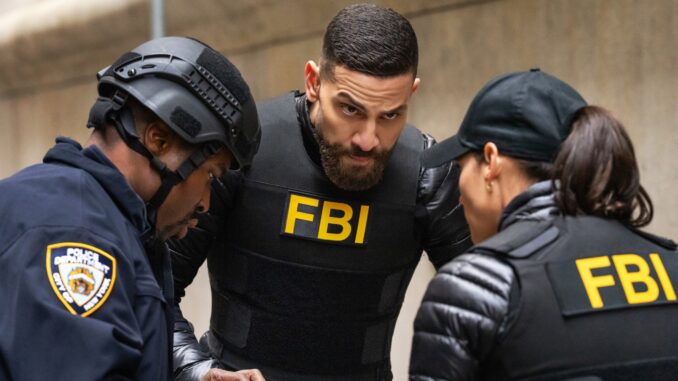
After seven adrenaline-fueled seasons, FBI Season 8 has taken a darker, more personal turn — one that doesn’t just challenge the team’s physical strength, but their emotional endurance. The show, long celebrated for its fast-paced action and moral clarity, now dares to ask harder questions: What does it cost to wear the badge? And when duty collides with conscience, who do you become?
This season strips away the procedural armor and looks straight into the hearts of its agents, revealing cracks formed by guilt, loss, and betrayal. In doing so, FBI isn’t just delivering thrilling television — it’s redefining what heroism means in a world where justice is rarely black and white.
The Weight of Guilt: OA’s Silent Struggle
At the emotional center of Season 8 stands OA Zidan (Zeeko Zaki), whose inner turmoil has become one of the most compelling arcs in the series. Since his early days, OA has been portrayed as calm under pressure — a man whose discipline and sense of honor anchor the team. But the new season opens with an explosion, both literal and metaphorical, that tears through that composure.
Haunted by a mission gone wrong and the lives lost under his watch, OA begins to crumble beneath the quiet weight of guilt. The writers smartly weave this psychological conflict into the procedural framework, turning each case into a reflection of his state of mind. Every suspect interrogation feels like self-interrogation; every arrest a penance.
In Episode 3, when Maggie (Missy Peregrym) urges him to let go of what he couldn’t prevent, OA answers with a chilling honesty:
“If I stop carrying it, who will?”
It’s one of the most human lines the series has ever written — a raw acknowledgment that guilt isn’t always a wound to heal. Sometimes, it’s the price of compassion.
Maggie Bell: The Strength in Stillness
While OA battles internal chaos, Maggie Bell represents the counterbalance — a force of quiet resilience. After years of loss and recovery, Maggie has evolved into the emotional core of the team. Season 8 gives her a more introspective role, exploring how empathy and endurance can coexist in a profession built on danger.
In FBI’s latest episodes, Maggie isn’t simply chasing criminals; she’s managing people — her team, witnesses, even victims — with grace and precision. Her calm demeanor isn’t detachment; it’s discipline.
When the Bureau’s integrity comes into question after an internal betrayal, Maggie becomes the glue holding everyone together. In one of the standout moments of the season, she reminds OA:
“We don’t get to choose the scars this job leaves us. But we do get to choose what we do with them.”
That single line encapsulates Maggie’s evolution — no longer defined by tragedy, but by transformation.
Betrayal from Within: The Mole That Shattered Trust
Perhaps the most shocking storyline in FBI Season 8 is the internal betrayal arc — the discovery that someone inside the Bureau has been leaking classified intel to criminal organizations.
It’s a bold creative risk for a show that traditionally pits its heroes against external threats. By moving the danger inside the Bureau, FBI forces its characters to confront a far deeper fear: the collapse of trust.
When Tiff (Katherine Renee Kane) and Scola (John Boyd) uncover inconsistencies in their own data logs, paranoia begins to spread like wildfire. Every hallway glance, every missing file, every late-night text becomes suspicious.
Showrunner Rick Eid explained in a recent interview that this season’s theme was “truth under pressure.”
“It’s easy to be righteous when the enemy is out there,” he said. “It’s much harder when the enemy might be sitting across from you.”
That’s exactly what makes this arc so gripping. The agents who once trusted each other with their lives are now second-guessing every move. It’s not just about solving cases — it’s about surviving the collapse of faith within their own institution.
The Price of Duty: When the Job Demands Too Much
Season 8 doesn’t just amplify the danger — it questions the moral cost of service. The agents’ lives outside the Bureau are barely recognizable, fractured by the demands of their work.
Jubal Valentine (Jeremy Sisto), once the steady strategist of the team, finds himself confronting burnout and emotional detachment. His decisions have grown sharper but colder, his empathy dulled by years of triage leadership. In one poignant scene, a fellow agent accuses him of losing his humanity. Jubal replies quietly:
“You can’t lose what you give away to save others.”
It’s a haunting admission — the kind that defines the tone of FBI this season. Every victory feels heavier. Every success comes with invisible scars.
A New Level of Cinematic Storytelling
From a technical standpoint, FBI Season 8 has raised the bar. The direction leans more cinematic, with tighter close-ups, shadowed lighting, and emotionally charged pacing that mirrors the characters’ unraveling states.
Episode 4, for instance, opens with a disorienting tracking shot through the aftermath of an explosion — the camera following OA’s dazed perspective, sound fading in and out as chaos unfolds. It’s visceral, immediate, and deeply personal.
The writing team deserves equal credit. The dialogue is sharper and more introspective, blending high-stakes procedural intensity with philosophical reflection. FBI has evolved from a formulaic crime drama into something closer to a character study — a meditation on sacrifice, morality, and the fragile balance between justice and self-preservation.
Fans Feel the Shift — and They’re Loving It
Social media reaction to FBI Season 8 has been electric. Longtime viewers are calling it the show’s “boldest and most emotional” season yet.
One fan tweeted:
“This isn’t just about catching bad guys anymore. It’s about what happens when the good ones break.”
Another wrote:
“OA’s storyline this year is cinematic. The guilt, the anger, the humanity — Zeeko Zaki is delivering Emmy-level work.”
The fanbase seems united in its praise for the show’s willingness to evolve. By trading predictable cases for layered character arcs, FBI has transformed from a procedural into a profound reflection on what heroism costs in the real world.
No Heroes Without Humanity
Perhaps the greatest success of FBI Season 8 lies in its refusal to glorify perfection. Instead, it celebrates imperfection — the doubts, guilt, and sacrifices that come with wearing the badge.
The agents are no longer just law enforcers; they’re human beings trying to reconcile the moral contradictions of their work. They save lives, but sometimes lose pieces of themselves in the process.
In the final moments of Episode 5, Maggie’s voiceover echoes over a city skyline:
“We chase justice, but justice doesn’t chase us back. All we can do is keep running.”
It’s a poetic summation of what FBI has become — not a story about victory, but about endurance.
